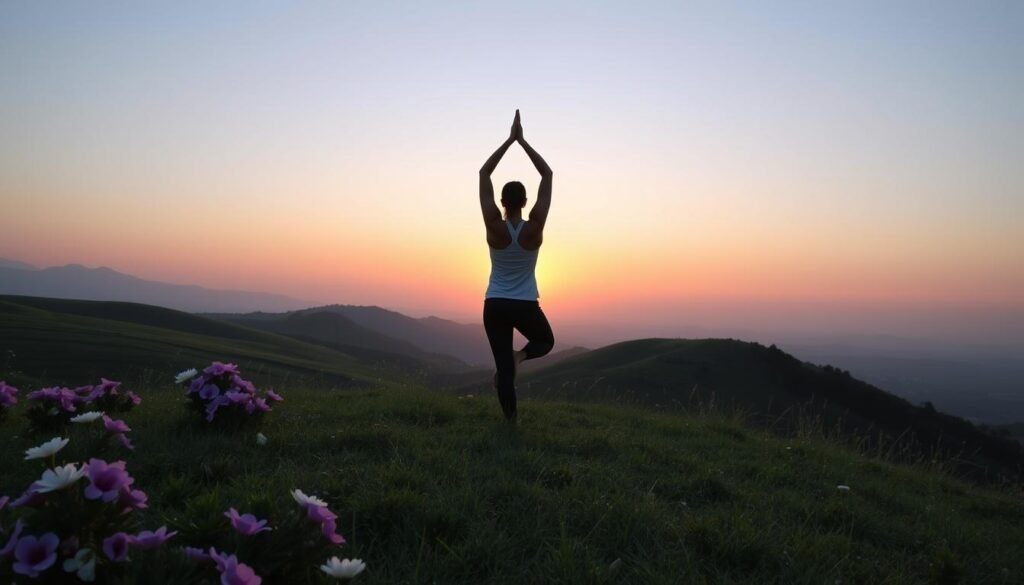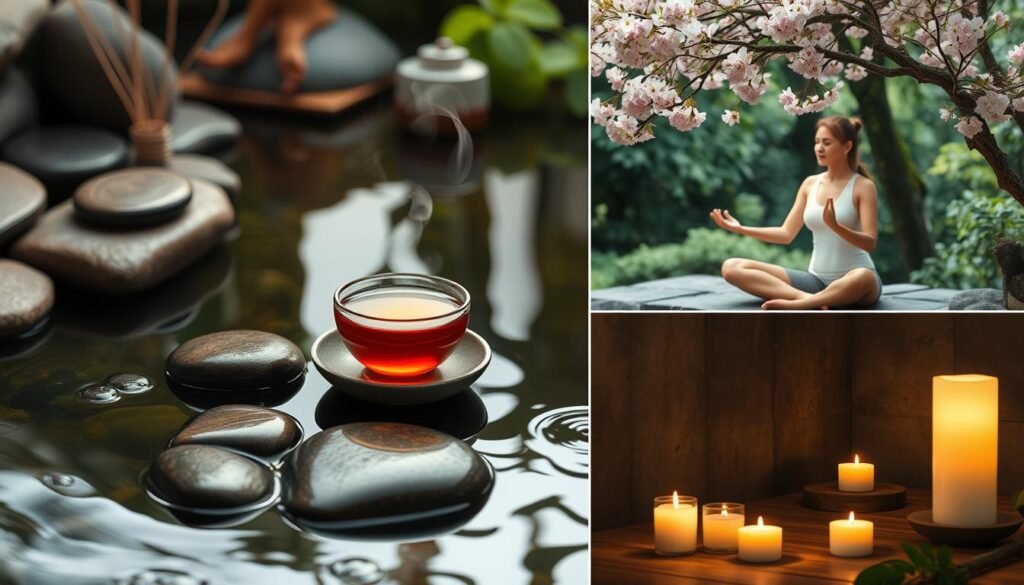Anxiety disorders are very common in the United States. They affect over 40 million adults. Many people feel fear, dread, or worry which makes them look for anxiety treatment without medication. While medications work, many are choosing natural remedies to find relief without drugs.
In this piece, we’ll cover different methods that focus on holistic therapies and life changes. These can bring back balance and calm. There are several ways to handle anxiety without needing medicine. By knowing what causes and what are symptoms of anxiety, people can better deal with it.
Interested in herbal approaches? Check out natural herbal remedies for anxiety.
Key Takeaways
- Anxiety impacts over 40 million U.S. adults, showing the importance of finding good treatments.
- Natural anxiety solutions include lifestyle adjustments, mindfulness, and changing what you eat.
- Exercise helps reduce anxiety by increasing endorphins and serotonin.
- Herbs like chamomile and Ashwagandha could be useful for anxiety symptoms.
- Talking to healthcare providers before starting new treatments is crucial for safety and success.
Understanding Anxiety Disorders
About 40 million adults in the U.S. face anxiety disorders each year. These include conditions like generalized anxiety disorder, panic disorder, and social anxiety. Knowing about anxiety means understanding the intense fear or worry that often shows up with these issues.
Nearly 20% of American adults deal with some form of anxiety yearly. Bad sleep and poor eating can make things worse. For example, not eating can lower your blood sugar. This makes your body release cortisol, a stress hormone.
About 15 million adults struggle with social anxiety. Generalized anxiety affects close to 7 million people in the U.S. Panic disorder is seen in about 6 million, mostly women. One in three kids will face anxiety, showing how common it is.
Understanding anxiety also means looking at what causes it. This could be genetics, your surroundings, or mental factors. Knowing this can help find the best ways to manage it. Activities like exercise and meditation can help reduce anxiety. Everyone’s experience with anxiety is different, so treatment needs to be personalized.
| Type of Anxiety Disorder | Annual Affected Individuals |
|---|---|
| Generalized Anxiety Disorder | ~7 million |
| Panic Disorder | ~6 million |
| Social Anxiety Disorder | ~15 million |
| General Lifetime Prevalence | ~31.1% of adults |
If not treated, anxiety disorders can get worse and even lead to depression. By really understanding and recognizing these disorders, people can look for the help they need. This can improve their life quality.
Common Symptoms of Anxiety
Anxiety comes in many forms and can mess with your daily life. You might feel:
- Nervousness
- Irritability
- Racing heart
- Excessive sweating
- Difficulty concentrating
These signs can really change how well you live your life. Knowing about them is key. It helps you get the right help or try new ways to feel better. Writing down what you notice helps doctors plan how to help you.
Understanding and noting down how anxiety affects you is crucial for finding the best treatment.
If anxiety is a constant battle for you, there are ways to feel better. Things like deep breaths, relaxing your muscles, or doing fun stuff are good for your mood. If these don’t help enough, see a doctor for more advice, especially if your anxiety is often or really strong.
Different treatments can make a huge difference and help you on your way to feeling mentally stronger. If you’re looking for non-drug options, you might find this resource useful.
Causes of Anxiety Disorders
Anxiety disorders come from many factors that mix in complex ways. Genetics play a big role in getting anxiety. Often, if your family has anxiety issues, you might too. This shows how important genes are.
Brain chemistry also matters a lot. Things like serotonin and dopamine affect how we feel. If they’re not balanced, we may feel more anxious. This is why keeping our brain healthy is key.
Stress from our surroundings can make anxiety worse. Big life changes or tough times can make us extra stressed. This can lead to long-term anxiety. Also, scary experiences can make us more prone to it.
Long-term health problems can also lead to anxiety. Problems like issues with your thyroid can be a cause. Understanding these health issues is vital for managing anxiety.
Knowing why we get anxious can help us find ways to cope. It’s important to recognize what makes our anxiety worse. Self-help and therapy like cognitive behavioral therapy can improve how we deal with anxiety. With support, people can manage their symptoms and live better lives.
| Factor | Description |
|---|---|
| Genetics | Family history of anxiety disorders increases susceptibility. |
| Brain Chemistry | Imbalances in neurotransmitters can trigger anxiety. |
| Environmental Stressors | Life events and stress can lead to heightened anxiety symptoms. |
| Trauma | Past traumatic experiences can form the basis of anxiety disorders. |
| Chronic Health Conditions | Underlying health issues such as thyroid disorders may increase anxiety levels. |
Importance of Natural Remedies for Anxiety
Natural remedies for anxiety offer a different path from traditional drugs. They help people get in touch with their bodies and minds. Through lifestyle changes, diets, mindfulness, and exercise, they greatly reduce anxiety.
Exercise is a powerful way to fight off anxiety. It releases endorphins, boosting your mental well-being. Herbal solutions like chamomile and lavender also stand out. They have calming effects that help with anxiety.
Chamomile tea can even adjust your cortisol levels. This hormone is closely linked to stress.
Other options like CBD oil from hemp and weighted blankets deserve a look. CBD oil is noted for its potential benefits. Yet, caution is needed with herbs like kava due to possible serious side effects. These natural remedies show the increasing interest in non-drug treatments for anxiety.
Dietary Changes for Anxiety Management
Changing your diet thoughtfully can really help with anxiety. It’s about keeping your blood sugar stable and watching what you drink and eat. A good diet gives you the right nutrients to help control mood and energy.
Role of Blood Sugar Levels
Managing your blood sugar is key to feeling less anxious. If you skip meals or eat too much junk food, your blood sugar could go up and down. This can make you feel more anxious. Eating foods like fiber, fruits, veggies, lean meats, and complex carbs can keep your energy even and your mood up.
Effect of Caffeine and Alcohol
It’s important to cut down on caffeine and alcohol if you’re dealing with anxiety. Caffeine might make you feel awake at first but can lead to more anxiety and mess up your sleep. Even though alcohol might seem relaxing, it can actually make you feel more anxious later. Being careful with these can help you feel better.
| Food Type | Impact on Anxiety |
|---|---|
| Omega-3 Rich Foods (e.g., salmon) | May help reduce anxiety symptoms. |
| Dark Chocolate | Associated with lower depression symptoms. |
| Probiotic Yogurt | Linked to improved anxiety and quality of life. |
| Turmeric | May aid in reducing anxiety through anti-inflammatory properties. |
| Hydration | Mild dehydration can negatively affect mood. |
Making these changes to your diet can make you feel better mentally and give you the nutrients you need. By keeping an eye on your diet and making adjustments, you can find more peace and better health.
Exercise as a Non-Pharmacological Anxiety Management
Getting active is a great way to handle anxiety without meds. Exercise helps calm the mind and makes you feel better. Adding both regular workouts and fun activities can greatly improve your mood and mental health.
Benefits of Aerobic and High-Intensity Exercise
Running and swimming are great for fighting anxiety. The U.S. Department of Health suggests adults should do 150 minutes of moderate or 75 minutes of hard aerobic activity each week. These activities help release feel-good hormones and distract you from stress, making you feel happier.
Structured exercise programs also build confidence and allow you to meet people. Finding workouts you enjoy helps you stick with them longer, making you feel even better.
Nature Walks and Anxiety Relief
Walking in nature is a simple way to reduce anxiety. Studies show that regular walks boost your mood and help you unwind. This easy activity is good for your body and mind, fitting perfectly into a balanced approach to anxiety management.

| Type of Exercise | Duration (Weekly) | Benefits |
|---|---|---|
| Aerobic Exercise | 150 minutes moderate / 75 minutes vigorous | Reduces symptoms, boosts mood, releases endorphins |
| Nature Walks | At least 30 minutes, several times a week | Improves mood, provides relaxation, enhances mindfulness |
| High-Intensity Workouts | At least 75 minutes | Increased endorphin levels, improved confidence |
By choosing different ways to exercise, you can seriously improve your mental health and fight off anxiety. It’s important to find activities you love. This helps you keep going and boosts your happiness and health.
Mindfulness Techniques for Anxiety
Mindfulness techniques help reduce stress and increase happiness. Studies show meditation and controlled breathing reduce anxiety and improve mental health. These methods let people focus on now, managing emotions better.
Practicing Meditation
Meditation is a strong way to combat anxiety. Setting goals before meditating helps people stay on track and handle stress. There are apps and online platforms for easy meditation. Just five minutes a day can calm the mind and help beat stress.
Breathing Exercises and Their Impact
Breathing exercises also fight anxiety. Taking deep breaths during the day helps lower heart rate and relax. Writing in a journal can clear the mind, helping to organize thoughts and feelings. Adding deep breaths and journaling into daily life improves anxiety management.
| Technique | Benefits | Suggested Practice Time |
|---|---|---|
| Meditation | Reduces stress, enhances focus | 5-20 minutes daily |
| Breathing Exercises | Induces relaxation, lowers heart rate | 2-10 minutes throughout the day |
| Journaling | Calms the mind, organizes thoughts | 5-15 minutes several times a week |
Adding nature into these practices is also good. Being outside and using all your senses enhances mindfulness experiences. A quiet place is best for meditation and other exercises. This way, these methods can work better against anxiety.
For more info on nature-based anxiety help, check out these resources.
Cognitive-Behavioral Strategies for Anxiety
Cognitive-behavioral therapy (CBT) is a top method for tackling anxiety. Studies show that it can greatly lower anxiety in just eight sessions, without meds. It helps people change bad thought habits and become more emotionally strong.
In the U.S., about 18% of adults have anxiety each year. This shows how crucial good treatments are. CBT teaches people to fight off negative thoughts. They learn to spot, question, and change these thoughts for the better.
CBT also includes facing fears little by little. This method, called exposure therapy, slowly reduces anxiety. Relaxation methods like deep breathing and muscle easing are also used. They help calm anxiety fast.
Adding mindfulness to CBT makes it even better. It keeps people in the now, away from worries of the past or future. This mix boosts the power of CBT against anxiety.
Getting better with CBT needs time and effort. Sadly, only 37% of those with anxiety get help. Websites like Cognitive Behavioral Therapy for anxiety offer help. They let people manage their mental health on their own.

Finding Support through Community
Connecting with a community can change lives for people dealing with anxiety. Being around others who understand what you’re going through helps a lot. It gives you a sense of being part of something, and you get support to handle anxiety better.
Benefits of Support Groups
Support groups for anxiety are special places. People share their stories and how they cope. This sharing helps everyone feel less alone. It also gives new ideas on handling tough situations. Let’s look at some benefits of joining these groups:
- Enhanced Coping Strategies: Members talk about what helps them with anxiety. This adds new tools to everyone’s coping box.
- Reduced Feelings of Isolation: Meeting others who get it fights off loneliness. This is important for people with anxiety.
- Validated Experiences: It’s comforting to hear that others have similar struggles. It makes your own experiences feel acknowledged.
- Access to Diverse Perspectives: Groups bring different views on coping and healing. This broadens everyone’s understanding.
- Encouragement for Seeking Professional Help: Being in a group can motivate you to find more help or therapy. This boosts your path to feeling better.
Studies show that support groups add a lot to professional treatment. They offer peer support that makes overall healing better. So, for those facing anxiety, joining a support group can be really helpful.
| Aspect | Support Groups | Professional Therapy |
|---|---|---|
| Environment | Peer-centered, informal | Structured, clinician-led |
| Accessibility | Often community-based or online | Requires appointments and may involve costs |
| Focus | Shared experiences and support | Diagnosis and treatment plans |
| Personal Growth | Encourages sharing and learning from peers | Provides professional techniques and therapies |
Being part of a supportive community, especially in anxiety support groups, can really help. It builds up your strength and connects you with people on a similar journey.
Complementary and Alternative Therapies for Anxiety
Exploring different therapies for anxiety helps people find many ways to cope. Techniques like massage and acupuncture add to usual treatments. They offer whole-body ways to relax and feel better.
Massage and Acupuncture Techniques
Massage therapy is a top pick for those looking for other ways to tackle anxiety. It eases muscle tightness and boosts circulation. This stress relief means lower anxiety for many who get massages regularly.
Acupuncture is another effective method for anxiety. It works by targeting certain body points to bring balance and calm. This old technique has helped lower anxiety for many, offering an alternative to drugs.
The Role of Aromatherapy
Aromatherapy uses essential oils to boost mental and physical health. Oils like lavender and chamomile are especially good at easing anxiety. Breathing in these scents can relax and lift your mood. Adding aromatherapy to your day is an easy way to fight anxiety, along with other healthy habits.

Anxiety Treatment Without Medication
Many people want to handle their anxiety without drugs. They prefer holistic methods that include lifestyle changes, therapy, and social support. These combine for big improvements, showing total wellness matters.
Holistic Approaches to Managing Anxiety
Using a whole-person view, holistic methods tackle anxiety by focusing on mind, body, and spirit. There are many ways to find relief. These strategies are proven to help:
- Mindfulness and Meditation: Mindfulness meditation lessens stress and helps clear your mind.
- Physical Activity: Exercise is highly suggested to fight anxiety symptoms.
- Nutritional Support: Eating foods with omega-3, B12, and D vitamins supports your mental state.
- Animal Therapy: Time with pets brings comfort and lowers anxiety.
- Music Therapy: Calming music has a soothing influence on our minds.
- Herbal Remedies: Chamomile and lavender teas can help you relax.
- Community Engagement: Joining support groups offers connection and understanding.
Sticking to these methods is key, but it’s worth it for a drug-free life. Journaling and spending time outdoors are also great for reducing anxiety.
Conclusion
Anxiety is a major issue worldwide, affecting around 264 million people. It’s key for those affected to find effective ways to cope. Methods like cognitive behavioral therapy (CBT), exercise, and mindfulness can greatly help. These strategies, along with strong support networks, make it easier to deal with anxiety.
Also, adding B-complex vitamins and magnesium to your diet can help. Many are now choosing treatments without side effects over traditional meds. Techniques such as deep breathing, yoga, and exposure therapy are effective, alternative ways to build emotional strength.
Mental health awareness is increasing, making anxiety management more important than ever. This new focus underlines the need for new methods that bring calm. To learn more about beating anxiety naturally, check out this detailed review.